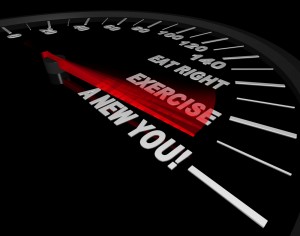Chapter 1 – Limiting the difference between your daily calorie consumption and daily calorie needs
 Whether your aim is to gain weight or lose weight, you should refrain from consuming too few calories or too many calories. Your calorie intake should never be extremely high or extremely low relative to your daily energy maintenance level.
Whether your aim is to gain weight or lose weight, you should refrain from consuming too few calories or too many calories. Your calorie intake should never be extremely high or extremely low relative to your daily energy maintenance level.
When weight loss is your aim, you should ensure your calorie deficit for the day never exceeds 15-20% of your daily energy maintenance level. Conversely, if your goal is to try and gain healthy, lean weight, you should ensure your calorie surplus is never more than 15-20% of maintenance.
Firstly, your own personal daily maintenance level simply equates to the number of calories you burn each day. This is also the number of calories that you would need to consume each day in order to balance your calorie intake with your calorie out-take and thus maintain the same weight.
If on a weight loss program, restricting your calorie deficit so that it never exceeds 15-20% of your maintenance level, and keeping your weight loss to a modest 1-2lbs per week with healthy eating and exercise, should ensure that fat, and not lean mass, is all you’re losing. It’s very important that you avoid losing any of your healthy lean mass reserves as this component of your overall weight will be vital for maintaining a fast metabolism. Similarly, if on a weight gain diet, limiting your gains to just 1lb per week through a combination of healthy eating and exercise should help ensure that the weight you add to your frame is lean mass only, and devoid of any of that undesirable fat content.
Now would be a good time to note that a net energy deficit of 3,500 calories equates to a loss of 1lb in body weight. It follows then that since 3500/7 = 500, a weight loss of 1lb per week is the equivalent to an average calorie deficit of 500kcals per day.
You should stay away from low calorie diets at all costs because they have a number of unhealthy side effects and will actually stop you from losing weight long term. More importantly, these diets will prevent you from losing body fat, which should be your only goal when you’re looking to lose weight. Low calorie diets will compromise your fat burning potential in the following ways:
1. decreased metabolism
2. loss of muscle (the good weight which keeps you burning energy and which contributes to a lower fat-lean weight ratio)
3. increased activity of fat-storing enzymes (Lipoprotein Lipase or LPL for short) and fat-storing hormones
4. decreased activity of fat-burning enzymes and hormones
5. decreased thyroid output
6. increased appetite
7. increased chance of regaining weight
8. decreased energy and work capacity.
Temporary, quick-fix diets can only ever produce temporary results. Seeing a sudden drop in your total weight on the weighing scales may provide an immediate and satisfying boost, but the reality is that drastic weight loss is a false economy which will adversely affect your health long-term and actually result in you being physically less well off than you were before you started restricting your calories by means of extreme dieting.
To lose fat permanently you have to change your entire attitude about nutrition and exercise. You need to replace the mind-set of short-term diets with the mind-set of lifelong habits.
Inspirational quote: If we attend continually and promptly to the little that we can do, we shall ere long be surprised to find how little remains that we cannot do….. Samuel Butler
